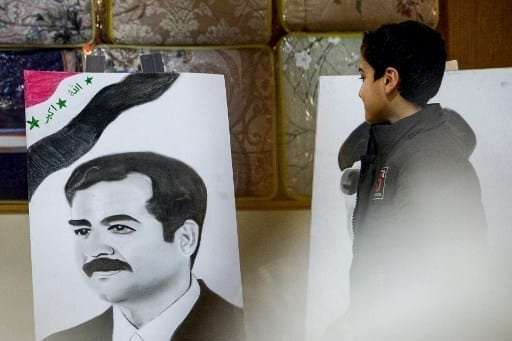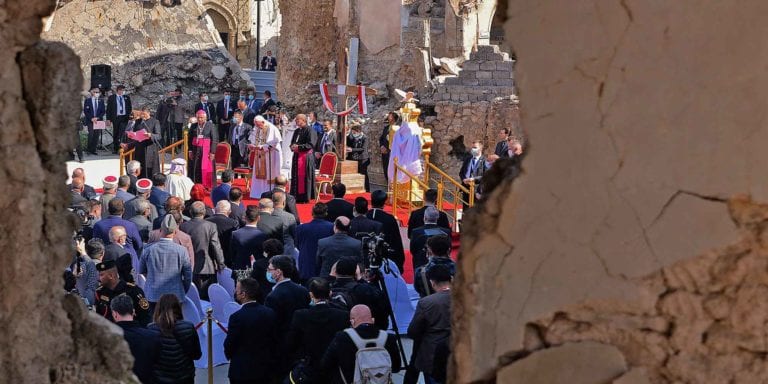More than 24 million people watched the first part of Raghad Saddam Hussein’s interview with Al Arabiya, which was live-streamed on Facebook. On YouTube the interview with Saddam’s eldest attracted 6.2 million views by the time these sentences were written. The title Looking for Raghad Saddam Hussein refers to another interview called Raghad Saddam Hussein Glimpses From Memory which was aired by Al Arabiya nine years ago and attracted some 28 million views.
Type the name Saddam Hussein on YouTube and his daughter Raghad will appear first, as if – by using her father’s name – she has taken over the scene 15 years after the execution of the tyrant, who became more famous than Al-Hajjaj Ibn Yusuf Al-Thaqafi.
What makes Saddam still so “alive” after all these years? Yes, Saddam, as it seems from the interview with his daughter Raghad on Al Arabiya is still alive.
His presence is not virtual, as some might think. It is real in its effect on millions of people who still refuse the idea of replacing him in their minds with any other leader. Saddam Hussein is alive to the degree that the interview with his daughter seems a vaccine against the virus of forgetting. It also seems the interview is trying to bring him back into the current political scene, specifically his image prior to the US-led invasion of Iraq.
The interview does not just remove the rope from his neck and dust off the humiliation when he was taken from the hole in which he was hiding, but rather brings him back to life and back to a time many Iraqis, whether they loved him or hated him, are nostalgic of.
In Kanan Makia’s novel Al- Fitna, Saddam says: “My dictatorship will stay alive among you like whispers, at the end of the night, in the living room when you discuss among your peers the daily scandals that surround you. This truth will stay alive after me because it is born in society. It is born naturally from the human instinct of unity, security and order. I gave you all of these things, but they faded away until being non-existent today. However, the desire of getting them back will not go away. And the moment you feel that desire, know that my soul has come back, to walk among you.”

A youth looks at a drawn sketch of late Iraqi ex-President Saddam Hussein beneath the historical flag of Hussein’s Iraq, on display at a charity bazaar in a shopping mall in Iraq’s northern city of Mosul on February 13, 2020. (Photo by Zaid AL-OBEIDI / AFP)
Those are the words of the tyrant in the Makia’s novel. It does not matter if these are truly his words or words Makia put in for narrative purposes. They are words that today sum up the return of the tyrant’s spirit to walk among Iraqis and Arabs alike.
Today is the moment everyone felt that unity, security and order are absent, even though they previously were only set by the tyrant through force, terror and massacres.
When I informed Makia of the number of views Al Arabiya’s interview with Raghad Saddam Hussein attracted, he appeared shocked. He told me over the phone from the US where he currently lives: “It is nostalgia. Let’s call it nostalgia to the Iraq of pre-2003. Iraqis then felt they had a state. It is true that it was an unfair state, and it is also true that the tyrant committed massacres, but people need stability. They look for it, even if it is in a nostalgic past.”
It is this that was somehow translated into the demands of the October 2019 revolution, when the slogan “we want a nation” was raised, i.e. people are looking for a lost nation.
The nostalgia for the era of Saddam is a nostalgia for some kind of nationhood that existed back then, in comparison to the chaos and non-nation existing today.
This makes sense, according to Makia, who noted that a nostalgia for the monarchy era accompanied the era of military coups witnessed in Iraq before the Ba’ath era.
Makia furthermore noted that “the fiasco of Iraqi political elites since 2003” is what makes Saddam, who was executed 15 years ago, so powerfully present and entrenched in the Iraqi, Arab and Muslim mind.
Political writer Hazem Saghieh agreed with Makia. “Iraq after Saddam did not work out,” he said. And millions of people, who do not care about politics, just want a safe country where power is centralized and not controlled by militias.
That too is essential for people, according to Makia. Many of them do not care about the concept of democracy, freedom of expression or rotation of power, as much as they care about living in security. They choose stability under a dictatorship over chaos under a supposed democracy.
Saghieh also said that executing Saddam on Eid al-Adha in 2006 made him a “collective martyr,” which helps mitigate his criminality and tyranny in the collective memory and increase his legendary status. The “imaginary” overpowers the “image” in the collective memory. Saghieh referred to a text he published in the book “Imagined Masculinities” published by Saqi in 2002 about the masculine presence of Saddam in the Arab popular imagination in general, and the Sunni popular imagination in particular. In his text, written before Saddam was overthrown, Saghieh claims Saddam tried to consecrate a paternal figure in the eyes of Iraqis.
“He is the one who supervises from above, hence giving others a feeling of stability and bonding at the same time,” he said. “He also gives them a feeling of security. He is the father, the leader and perfect male. He looks absolute and timeless.”
Saddam’s absoluteness and paternity seem to continue to manifest itself today through his daughter Raghad, whom Saghieh sees a continuation of the masculinity of her father. In the interview, she assures that, following the death of her brothers and husband (killed by Saddam), she is the only woman in the family who cares about public affairs. The other women take care of their households and husbands.
According to Saghieh, Saddam was the first to defy the new international order, following the collapse of the Soviet Union, by invading Kuwait. It is exactly what Bin Laden did ten years later. Two Sunni Arab leaders defied the victors of the cold war.
“It is the continuation of a catastrophic and disastrous tradition in our region, as they stood against the victors of World War I and II,” said Saghieh.
Does the fact that Saddam Hussein was Sunni and the absence of a Sunni personality in the region play a role in him occupying such a large political space in the Arab world even today? Saghieh puts the sectarian matter at the forefront of reasons allowing the nostalgia for Saddam and his era to expand. The Sunni-Shiite confrontation promotes it, especially with the Shia effectively taking over power in Iraq.
Sunnis find power in the imagination and legend linked to Saddam. Makia, however, does not completely agree with this notion. According to him, the nostalgia for Saddam is trans-confessional in Iraq. “I have Shia friends who hate Saddam, yet are nostalgic of his era,” he said.
Read Also:







